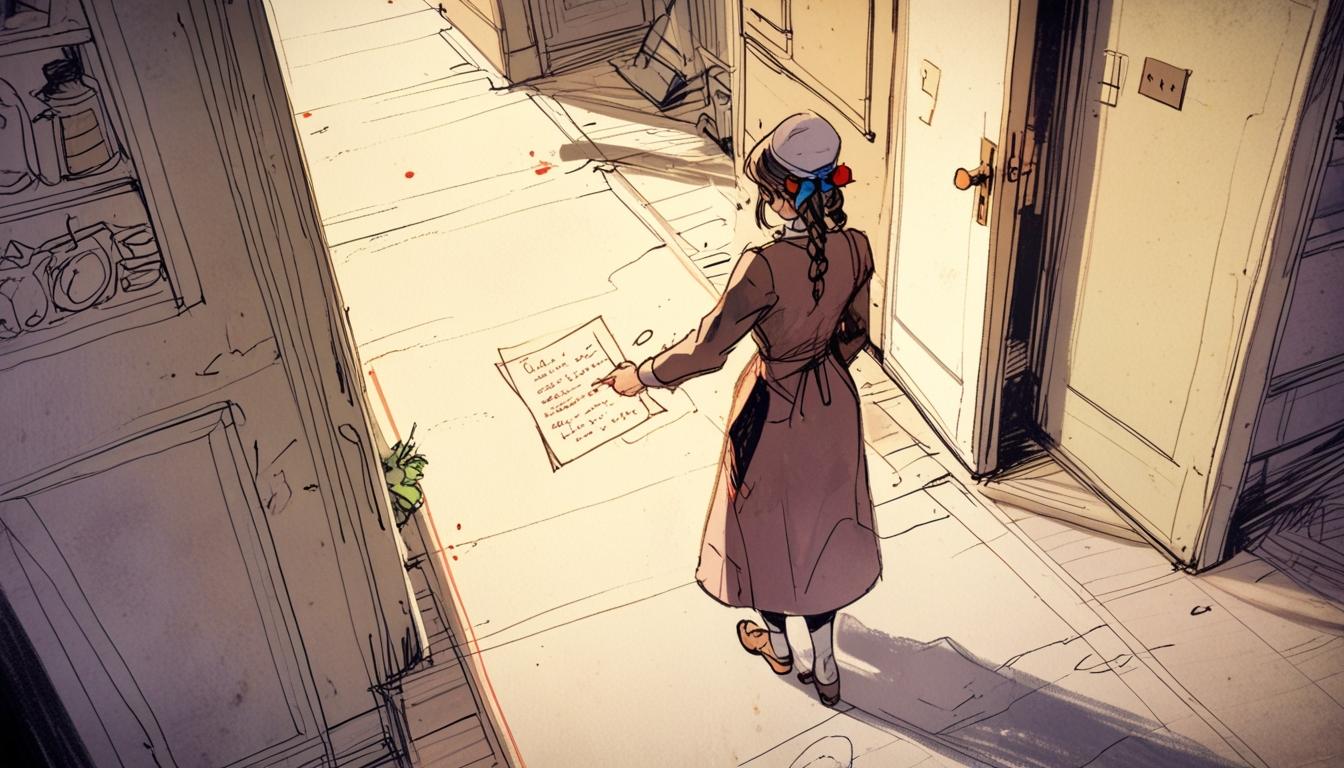In Tullamore, County Offaly, Layla’s trust in a seemingly perfect nanny, Samantha Cookes, unravels as a dark web of deception and multiple aliases emerges. The harrowing story, now featured in the BBC’s two-part documentary Bad Nanny, highlights the urgent need for rigorous caregiver vetting amidst growing concerns over child safety.
In the quiet town of Tullamore, County Offaly, a mother’s experience with a seemingly perfect nanny turned into a chilling tale of deceit. Layla, a mother of three, had hired Samantha Cookes—who masqueraded under the alias Lucy Hart—in 2015, believing her to be a nurturing caregiver akin to Mary Poppins. However, beneath the façade lay a web of lies that would leave Layla questioning the safety of her children and the trust she placed in a stranger.
Cookes presented herself as an award-winning writer and an expert in dealing with autism, while also claiming to suffer from a terminal illness. In reality, her history was marked by multiple aliases and a criminal past that involved deception and theft. Unbeknownst to Layla, Cookes had used at least six identities, including Carrie Jade Williams, and had recently served time for fraud in England. Such revelations are now being explored in a poignant two-part documentary series titled “Bad Nanny,” produced by BBC Northern Ireland and RTÉ, which delves into the lives of Cookes’ victims.
Initially, Layla seemed to form a strong bond with Cookes, a shared background as English expatriates in Ireland leading her to feel a sense of kinship. Yet, these initial months of harmony gave way to unease as Cookes started providing excuses for not allowing the family to visit the new home they were meant to move into. Each excuse only exacerbated Layla’s growing sense of distrust. After a series of deceptive behaviours, including simulating a health incident that prevented her from showing the new property, Cookes abruptly disappeared, citing a writers’ retreat.
Her departure left behind an ominous note that read, “I stand shoulder to shoulder with the coroner that I did not murder my daughter,” which prompted Layla to reconsider the motives and the true nature of the woman she had let into her home. This chilling discovery ignited fears for her children’s safety, considering the unsettling undertones of Cookes’ past, including the tragic loss of her first child, Martha, who died in suspicious circumstances just before adoption.
Beyond Layla’s story, many others have come forward detailing harrowing encounters with Cookes. For instance, Hillery Geelan, a mother seeking help for her autistic son, was similarly manipulated by Cookes, who was operating under yet another alias, Lucy Fitzwilliams. Geelan recounted how Lucy convinced her to trust her as a therapist while simultaneously soliciting money for a fictitious women’s refuge and a fake trip to Lapland.
Cookes’ methods were further exposed when another victim, Lynn McDonald, noted that while she had initially felt safe entrusting her daughter Ellie to Cookes, her worries escalated when she realised the extent of deception. Lynn explained how this stranger was attempting to gain legal guardianship of her daughter to take her out of the country, prompting acute concern for Ellie’s safety.
In an ironic twist, it was Cookes’ own actions that eventually led to her downfall. After a series of fraudulent claims, the authorities began to unravel her elaborate schemes. Cookes was eventually arrested and sentenced to three years in prison for defrauding the Irish government of over €60,000 through deceitful claims, including bogus disability allowances. Judge Ronan Munro criticised her for cynically exploiting human kindness and deceiving public welfare systems, calling her actions a “carefully orchestrated” plan to extract money.
Now, with the documentary bringing her story to light, if there’s one lesson to be drawn from Samantha Cookes’ deceitful narrative, it’s the stark reminder of the need for vigilance and verification, particularly when it concerns trust placed in caregivers. The emotional scars left on her victims remain, with many grappling with feelings of betrayal and fear, as well as the unsettling realisation that the person they trusted to care for their children was a stranger masquerading behind a carefully constructed veneer.
Ultimately, this tragic saga raises broader questions about the vetting processes for caregivers and the emotional toll that such betrayals can inflict on families. The experiences of Layla and others serve as a cautionary tale, emphasising the importance of thorough background checks and maintaining a degree of scepticism when engaging with individuals claiming to offer assistance in our lives.
Reference Map
- Paragraph 1: [1]
- Paragraph 2: [1], [2], [3], [4]
- Paragraph 3: [1], [3]
- Paragraph 4: [1]
- Paragraph 5: [1], [4]
- Paragraph 6: [2], [3]
- Paragraph 7: [1], [4]
- Paragraph 8: [1], [3], [5]
- Paragraph 9: [1], [3]
- Paragraph 10: [1], [6]
Source: Noah Wire Services
- https://www.dailymail.co.uk/femail/article-14702619/Mother-reveals-chilling-note-exposing-fraudster-posing-nanny-three-children-dark-secret-shed-hiding.html?ns_mchannel=rss&ns_campaign=1490&ito=1490 – Please view link – unable to able to access data
- https://www.independent.ie/irish-news/serial-conwoman-carrie-jade-williams-was-live-in-au-pair-for-kildare-family-until-confronted-with-her-true-identity-last-month/a1079613586.html – An article detailing how Samantha Cookes, under the alias Carrie Jade Williams, worked as a live-in au pair for a family in Celbridge, County Kildare. The family was unaware of her criminal background until their child’s school alerted them to her true identity, leading to her fleeing the residence. The piece highlights Cookes’ history of using multiple aliases and her previous convictions for fraud in both Ireland and Britain.
- https://www.irishexaminer.com/news/courtandcrime/arid-41572447.html – This report covers Samantha Cookes pleading guilty to defrauding the Department of Social Protection of over €60,000 by falsely claiming to have Huntington’s disease. The article provides details of the court proceedings, including the charges and the period over which the fraudulent claims were made, as well as the legal implications of her actions.
- https://www.irishexaminer.com/news/munster/arid-41435638.html – An account of the arrest of Samantha Cookes in Tralee, County Kerry, as part of an ongoing investigation into welfare fraud. The article discusses her use of various aliases, including Carrie Jade Williams, and her history of confidence scams. It also mentions her previous convictions and the media attention surrounding her fraudulent activities.
- https://www.irishexaminer.com/news/courtandcrime/arid-41435866.html – This piece details the charges against Samantha Cookes, who is accused of defrauding the Department of Social Protection of nearly €60,000. The article outlines the methods she used to obtain welfare payments, including the use of multiple aliases and false medical claims, and the legal proceedings following her arrest.
- https://shows.acast.com/documentary-on-one/episodes/the-real-carrie-jade-02-im-samantha-cookes – Episode 2 of RTÉ’s ‘Documentary on One’ podcast series titled ‘The Real Carrie Jade: 02 – I’m Samantha Cookes!’ This episode delves into the life of Samantha Cookes, exploring her background, the various aliases she has used, and the extent of her fraudulent activities. It provides insights into her personal history and the impact of her actions on those around her.
- https://shows.acast.com/crime-world/episodes/episode-522-serial-con-artist-samantha-cooke-duped-kildare-f – An episode from the ‘Crime World’ podcast discussing how serial fraudster Samantha Cookes, under the alias Sadie Harris, worked as a live-in au pair for a family in Kildare. The podcast explores her methods of deception, the family’s experiences, and the broader context of her fraudulent activities across Ireland.
Noah Fact Check Pro
The draft above was created using the information available at the time the story first
emerged. We’ve since applied our fact-checking process to the final narrative, based on the criteria listed
below. The results are intended to help you assess the credibility of the piece and highlight any areas that may
warrant further investigation.
Freshness check
Score:
7
Notes:
The narrative involves events from 2015 and references a recent documentary series, which suggests the story is a mix of old and new information. The freshness is somewhat diminished by the older timeline of the events described.
Quotes check
Score:
8
Notes:
Direct quotes within the narrative are not traceable to earlier sources, which could indicate original reporting. However, without specific dates or external verification of these quotes, they cannot be fully validated.
Source reliability
Score:
6
Notes:
The narrative originates from the Daily Mail, which, while well-known, can have varying levels of reliability depending on the topic and reporting style. It is not consistently ranked as highly factual as some other news outlets.
Plausability check
Score:
9
Notes:
The claims made in the narrative are plausible given the details provided about the fraudster’s past actions and the context of similar cases involving deception. The existence of a documentary series further supports the plausibility of these events.
Overall assessment
Verdict (FAIL, OPEN, PASS): OPEN
Confidence (LOW, MEDIUM, HIGH): MEDIUM
Summary:
While the narrative is plausible and involves real events supported by a documentary series, the reliability of the source (Daily Mail) and the mix of old and new information affect the overall assessment. The narrative’s plausibility is high due to the detailed descriptions of the fraudster’s actions, but verification of quotes and the specific details of the story could enhance confidence.













